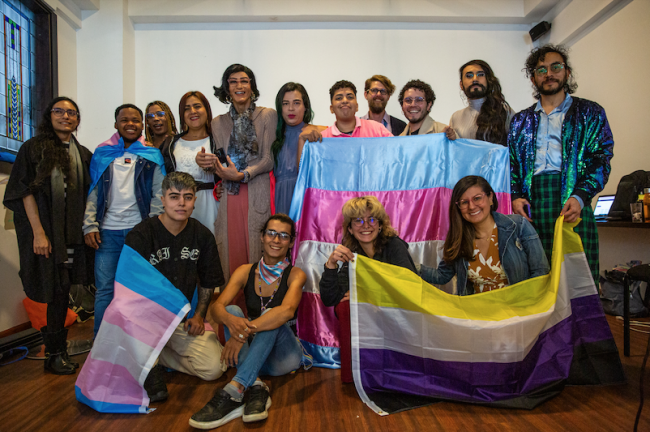
Slendy Yolainne Matiz’s perpetrators didn’t want her to see their faces. She remembers being thrown to the ground, a boot on her face. “I don’t even know if they were the same men that repeated or they were a hundred that had a go at me,” she says, her voice breaking.
“Many of us were left with scars. After what happened to me, I tried to clean the blood on my body so my mom wouldn’t see it and wouldn’t suffer,” Matiz recalls. “The most denigrating thing that can happen to you is the declaration of sexual violence.”
During a two-day conference in November in Bogotá, Matiz was one of 20 trans people who shared painful testimonies of violence with the Special Jurisdiction for Peace (JEP), a transitional justice mechanism created to address crimes connected to the conflict between the Revolutionary Armed Forces of Colombia (FARC) and the state. This event was called by the Action and Support Group Foundation for Trans People (GAAT) with the assistance of the UN Verification Mission in Colombia.
In a historic development, the JEP opened an investigation known as “macro-case 11” to gather information on “Gender-based violence, sexual violence, reproductive violence, and other prejudice crimes based on sexual orientation, expression, and/or diverse gender identity during the Colombian armed conflict.” Since the FARC and the government signed a peace agreement in 2016, the JEP has launched a series of macro-cases to examine common patterns in criminal abuses during the prolonged conflict, identify the perpetrators, and propose actions of restorative justice.
Colombia’s inclusion of LGBTQIA+ people in the peace process is groundbreaking. Although trans people suffer violations related to their gender identity in the context of conflict and beyond, they have been historically excluded from social and political spheres. According to the Peace Agreement Database of the University of Edinburgh, out of over 1,500 peace agreements globally between 1990 and 2016, only seven protected the rights of LGBTQIA+ people, including Colombia’s.
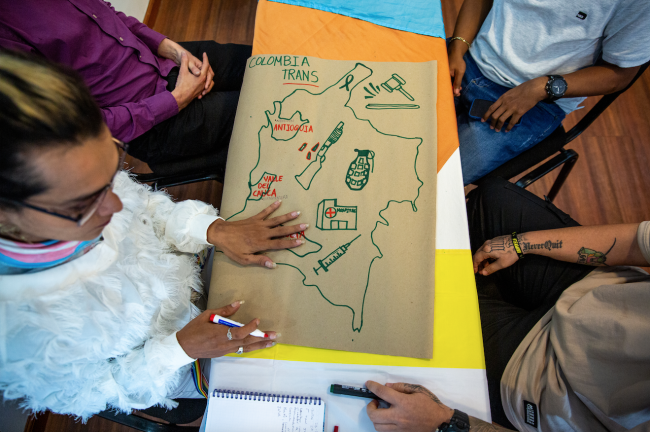
While this case has been celebrated, victims and rights organizations have highlighted its limitations. Since it only considers crimes related to the FARC-state conflict before 2016, it does not take into account recent violations or acts by other armed groups. "Transfemicides continue to be our biggest concern because we continue to die on the streets for being trans," said Samanta Durango, a victim of violence and displacement and an activist for sex workers’ rights.
Covering gender-based and sexual violence broadly, the macro-case also involves cis women, girls, and boys. Hunza Vargas, who works with the JEP, noted that: “Transgender victims wanted to be heard specifically in the context of their life experience due to the forms of victimization they experienced and due to the response by the state to their requests regarding the conflict.” Many victims described acts of discrimination within the justice system and a lack of progress on their cases. Durango says many trans people’s reports of violence are not taken seriously “because the biggest actors involved are the police themselves.”
According to Fidelma Ashe, a professor of politics specializing in gender and sexuality and a member of the Transitional Justice Research Institute at Ulster University, the implementation of the JEP’s recommendations for restorative justice will have to consider the victims’ specific identities. “Each group has to be recognized as having a particular history of oppression and as still experiencing forms of oppression and violence today,” Ashe explained. “That will be a challenging job because each group will have to work with policing, the government, and educators.”
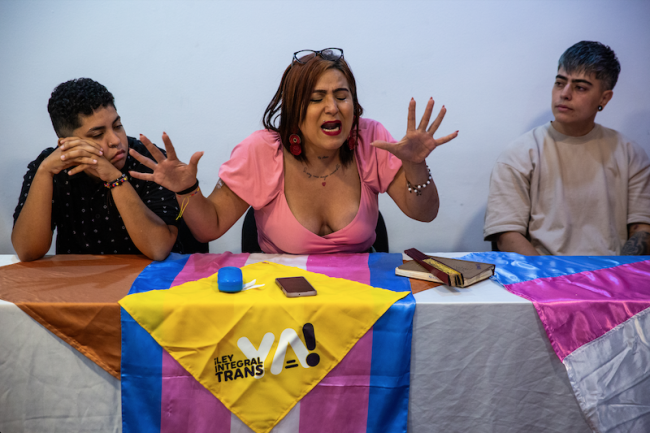
Inside the Case
Based on previous reports, the JEP has identified a preliminary count of 35,178 cases of violence based on gender or prejudice between 1957 and 2016. Of these cases, 33 percent are related to sexual orientation and gender identity or expression. Yet, civil organizations have pointed out that cases are likely to be underreported. According to the JEP, the most common types of violence are forced displacement followed by sexual violence.“In Santander, when the far-right paramilitary group United Self-Defense Forces of Colombia (AUC) was active, paramilitaries would load trans people into a truck and take them to be killed. Similar events occurred within the FARC as well. Although they claim they weren't as bloody, transgender women were killed just for dressing as women,” said Danna Cuellar, a former FARC militant recruited when she was underage who experienced forced displacement on more than one occasion.
One of the goals of the macro-case is to highlight the gendered dimensions of the conflict. In the justice system at large, there is an information gap when it comes to gender identity and sexual orientation. According to Marcela Páez, a lawyer who specializes in gender issues within the JEP, a preliminary examination identified 45 cases of sexual violence within the armed forces. However, only one of the victims was identified—as a gay man. In the other cases, there was no information about sexual orientation or gender identity. “What this shows is that we have a profound lack of knowledge and a great challenge to understand what happened,” Páez added.
As part of the dialogue process, the JEP will travel to different regions of the country. According to Vargas, the JEP will take measures to avoid revictimizing trans people and eliminate barriers that deter them from seeking institutional support. These measures include accepting their testimonies as proof of the events and recognizing victims’ self-identified names (as opposed to birth names) during the entire process. “I think we have suffered enough by keeping everything that happened to us inside and having to live in fear… revictimized and called liars,” said Karen Arboleda, an activist from Medellín who promotes the rights of sex workers and was present at the event.
Outside the ranks of state forces and the FARC, Cuellas said trans and non-gender conforming individuals have faced violence within the prison system, including denials of their gender expression, through acts such as the forced cutting of their hair. While incarcerated, she was also forced into sexual relations as a result of her identity. “Inside the prison, it became easier for me to let one man assault me than all of them,” said Cuellar, referring to a relationship she was forced into for “protection.”
Yuranis Muñoz, who joined the FARC when she was 17 and later transitioned in prison, also suffered discrimination and violence at the hands of guards and fellow combatants. She became an LGBTQIA+ rights activist, as well as a peace signatory. “Today, as a peace signatory I asked for forgiveness from the LGBT community for the ignorance of the FARC,” said Muñoz. “Our commitment is to help to build peace. But if people continue to be homophobic and transphobic, they are not contributing to peace-building.”
The JEP will hear statements from victims as well as members of the FARC and state forces, identify those most responsible for the crimes, and determine how the perpetrators should compensate the victims and society.
“The assassins who have killed us and the state who sent someone to kill us are the ones who have the truth,” said Matiz. “But if they don’t want to recognize what happened, nothing will change. We only want to be recognized as victims who didn’t ask to be part of this conflict.”
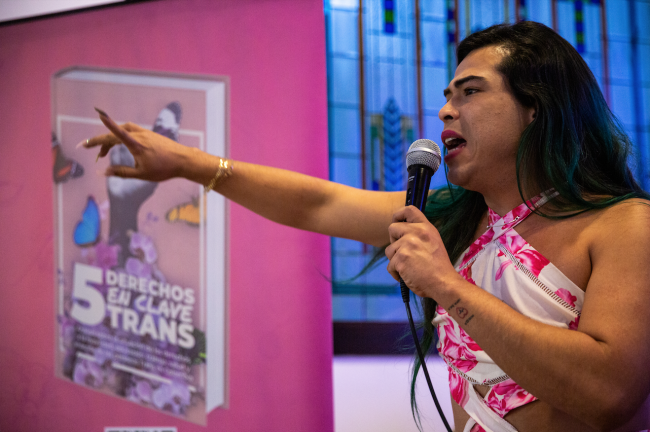
“My Body Didn’t Have Any Scars”
While the introduction of the macro case represents an immense achievement for the LGBTQIA+ community, the JEP will have to deal with pervasive feelings of distrust toward government institutions. Arboleda, the activist from Medellín, recalled in tears the sexual violence she suffered during the conflict, but at the time the Unit for Attention and Reparation of Victims––the government entity in charge of full reparation––did not recognize her as a victim. “They told me that ‘the time had passed’ or that ‘my body didn't have any scars.’ But the scars of being sexually abused by guerrillas and policemen, I carry them here,” said Arboleda, pointing to her head.
“What the state recognizes is not even half of what we, the real victims, have lived and suffered. How could we come forward as trans people, lesbians, gays, or travestis at a time when the majority of us were tortured and disappeared for identifying ourselves as diverse people?” asked Durango. She is from Medellín and witnessed Operation Orion, a military siege on the marginalized community of Comuna 13 in the name of combating illegal groups. Durango recalls being forced to receive a weapon to defend her neighborhood and her school being used as a combat base by armed groups. The operation left 43 civilians wounded, two fatalities, and hundreds of disappeared persons. “There were days that the only thing we ate was lead bullets because the shootings would last up to 8 hours,” said Durango.
Aside from not being validated as victims, obstacles to accessing justice for trans people begin with the lack of recognition of diverse gender identities on official forms, being referred to by their legal name (deadname), or being denied attention based on their gender identity. “When I went to denounce [an act of violence] at the prosecutor's office, I very clearly said it was an act of transphobia. But in the paperwork, they said I was a lesbian woman due to my gender in my document,” said Samuel Ortíz who traveled from Cartagena to be part of the event. “Even though I explained that I wasn’t a lesbian woman but a transgender man, they kept repeating that this couldn't be included because it wasn't part of the paperwork.”
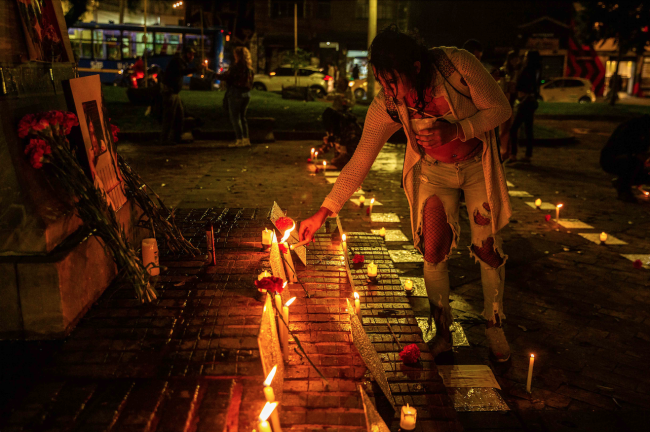
Toward Restorative Justice
The Havana Agreement, as Colombia’s historic 2016 peace agreement is known, is considered “a template for progress in the area of LGBT peoples’ rights in peace agreements,” according to the transitional justice scholar Ashe. “The good thing about the Colombian agreement was that it fully recognized LGBT people have been affected by the conflict. That is essential because if you have been part of the conflict or have been damaged by the conflict, then you must be part of the peace,” she added.
Despite this, seven years later many Colombians continue to wait for the full implementation of the agreement. For the attendees, a formal apology from the perpetrators is key to restorative justice. It is also essential to integrate processes of transitional justice across the different institutions related to the peace accords, not only within the JEP. “We need a special chapter with integral reparation that includes physical and mental health, shelter, work, study, mobility, and safety,” said Cuellar. Other participants emphasized the need to establish laws that guarantee the rights of trans people beyond the conflict, the integration of participatory mechanisms of decision making, and the creation of safe social and cultural spaces for trans people.
For her part, Cuellar does not believe there will be full reparations but she is motivated by the hope that the process will support future generations. “My struggle ends the day I stop breathing because I don’t want those who are yet to be born to have to live what I had to live.”
Natalia Torres Garzón graduated with an M.Sc. in Globalization and Development at the School of Oriental and African Studies in London, United Kingdom. She is a freelance journalist who focuses on social and political issues in Latin America, especially in connection to Indigenous communities, women, and the environment. Her work has been published in Mongabay, Earth Island, New Internationalist, Toward Freedom, El País, El Salto, Esglobal, and others.
Antonio Cascio is an Italian photojournalist based in Colombia. His work focuses on social movements, environmental justice, discriminated groups, and Indigenous communities. He is a Reuters stringer photographer. His photos have been published in The Guardian, CNN, BBC, DW, Revista 5W, El País, NACLA, Mongabay, Earth island Journal, Amnesty International, and more. His works have been awarded at the Paris Photo Prize 2023, the IPA, BIFA, and EPA.

